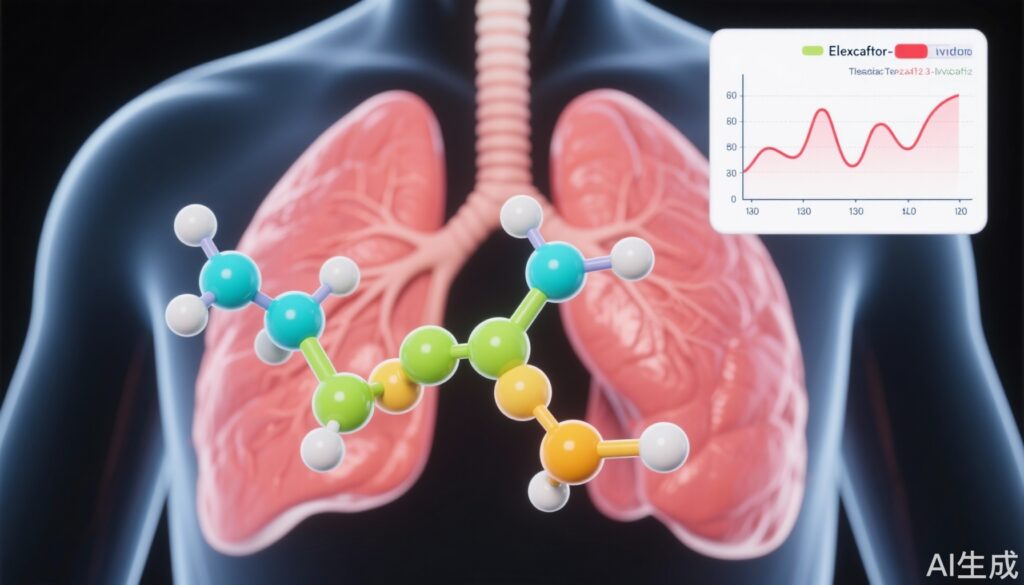Highlight
The triple combination therapy of elexacaftor-tezacaftor-ivacaftor significantly reduces 2-hour post-oral glucose tolerance test blood glucose levels in cystic fibrosis (CF) patients with impaired glucose regulation. It also lowers hemoglobin A1c (A1c) and sweat chloride concentrations, indicating improved glycemic control and enhanced CF transmembrane conductance regulator (CFTR) function. The treatment is well tolerated, with predominantly mild or moderate adverse events reported.
Study Background and Disease Burden
Cystic fibrosis is a multisystem genetic disorder characterized primarily by mutations in the CFTR gene, leading to thickened secretions that affect pulmonary, digestive, and endocrine function. Among its numerous complications, cystic fibrosis-related diabetes (CFRD) is a common comorbidity, affecting 20-50% of adult CF patients and contributing significantly to morbidity and mortality. CFRD emerges due to pancreatic islet dysfunction, influenced by factors including fibrosis, inflammation, and chronic infection. Impaired glucose tolerance (IGT) often precedes CFRD, making early intervention critical to improving outcomes.
While CFTR modulator therapies have transformed CF care by restoring function to defective CFTR proteins, their effects on endocrine pancreatic function and glucose metabolism remain under investigation. Elexacaftor-tezacaftor-ivacaftor, a triple combination therapy, has been approved for treating CF due to its significant impact on pulmonary function and quality of life. Preliminary observations suggested potential benefits on glucose metabolism, but controlled clinical data were lacking to confirm this.
Study Design
This investigation was a phase 3b, open-label clinical trial conducted across multiple sites in Australia and the European Union. The study enrolled 69 patients diagnosed with cystic fibrosis who were either exhibiting impaired glucose tolerance or established CFRD. The mean age of participants at baseline was 25.1 years, with a slight male predominance (55.1%).
Participants received the triple therapy of elexacaftor-tezacaftor-ivacaftor daily for 48 weeks without a comparator or placebo group, as per the open-label design. The primary endpoint was the change from baseline in 2-hour blood glucose levels during an oral glucose tolerance test (OGTT), averaged over weeks 36 and 48. Secondary endpoints included changes in glucose tolerance category (normal, impaired, or CFRD) by week 48 and measurements of hemoglobin A1c and sweat chloride levels. Safety and tolerability were also rigorously assessed throughout the study period.
Key Findings
The administration of elexacaftor-tezacaftor-ivacaftor resulted in a statistically significant and clinically meaningful reduction in 2-hour post-OGTT blood glucose levels. The mean decrease was 35.0 mg/dL (approximately 1.94 mmol/L) from baseline to the average measurement at weeks 36 and 48 (P < .0001). This reduction suggests improved glucose clearance indicative of enhanced insulin secretion and/or sensitivity.
Among the subset of 53 participants presenting initially with abnormal glucose tolerance, 37.7% demonstrated an improvement in glucose regulation as classified by dysglycemia categories at week 48. This improvement encompassed transitions toward normal glucose tolerance or amelioration within the spectrum of impaired tolerance and diabetes.
Furthermore, hemoglobin A1c levels decreased modestly by 0.16% at week 48 from baseline, indicating improved overall glycemic control. Importantly, sweat chloride concentrations—a validated biomarker of CFTR function—dropped significantly by 48.7 mmol/L, reflecting enhanced CFTR activity correlated with therapeutic effects.
Safety profiles were reassuring. Most adverse events were mild or moderate, with the most common being infections such as COVID-19, headaches, pyrexia, and nasopharyngitis. No new safety signals emerged, and the therapy was well tolerated over the extended treatment period.
Expert Commentary
The observed improvements align with prior smaller-scale observational studies, consolidating evidence that targeting CFTR dysfunction with elexacaftor-tezacaftor-ivacaftor may exert beneficial effects beyond pulmonary outcomes, extending to endocrine pancreatic function and glucose homeostasis.
However, this open-label design, lacking a placebo or active comparator arm, constrains definitive efficacy attribution solely to the drug without confounding factors. Notably, the trial could not delineate whether the improvements in glucose metabolism stemmed directly from restored CFTR function in pancreatic beta cells or indirectly via enhanced lung health and reduced systemic inflammation.
This nuance is critical since CF-related systemic inflammation and recurrent infections impair insulin production and sensitivity. Addressing this could shape management strategies and prompt consideration of early initiation of triple therapy to mitigate CFRD progression.
Conclusion
This phase 3b trial provides compelling evidence that elexacaftor-tezacaftor-ivacaftor significantly improves glucose regulation in cystic fibrosis patients with impaired glucose tolerance or cystic fibrosis-related diabetes. The therapy is associated with lowered 2-hour post-OGTT glucose levels, improved dysglycemia categories in a substantial proportion of participants, and modest reductions in A1c and sweat chloride levels.
These findings support incorporating CFTR modulator therapy not only for pulmonary benefits but also as a potential approach to improve endocrine pancreatic function and metabolic outcomes in CF. Future randomized controlled trials are justified to further clarify mechanisms and long-term impacts on diabetes progression and overall CF morbidity.
Clinicians should consider these benefits when evaluating therapeutic strategies for CF patients with early glucose abnormalities. Close monitoring of glycemic parameters alongside pulmonary function remains essential in comprehensive cystic fibrosis care.
References
1. Durieu I, Clements B, Fabrizzi B, et al. Impact of Elexacaftor/Tezacaftor/Ivacaftor on Glucose Tolerance and Abnormal Glucose Metabolism: A Phase 3b, Open-Label Clinical Trial. Am J Respir Crit Care Med. 2025 Aug 11. doi:10.1164/rccm.202411-2312OC. Epub ahead of print. PMID: 40788823.
2. Moran A, Pillay K, Becker DJ, et al. Clinical care guidelines for cystic fibrosis-related diabetes: a position statement of the American Diabetes Association and a clinical practice guideline of the Cystic Fibrosis Foundation. Diabetes Care. 2010;33(12):2697-2708.
3. Bellin MD, Bridgewater C, Ekinci E, et al. Insulin secretion improves in cystic fibrosis following ivacaftor correction of CFTR: a small pilot study. Pediatr Diabetes. 2013;14(6):417-421.
4. Stephenson AL, Sykes J, Stanojevic S, et al. Improving survival in cystic fibrosis: findings from a cohort study. Thorax. 2017;72(9): 793-799.



